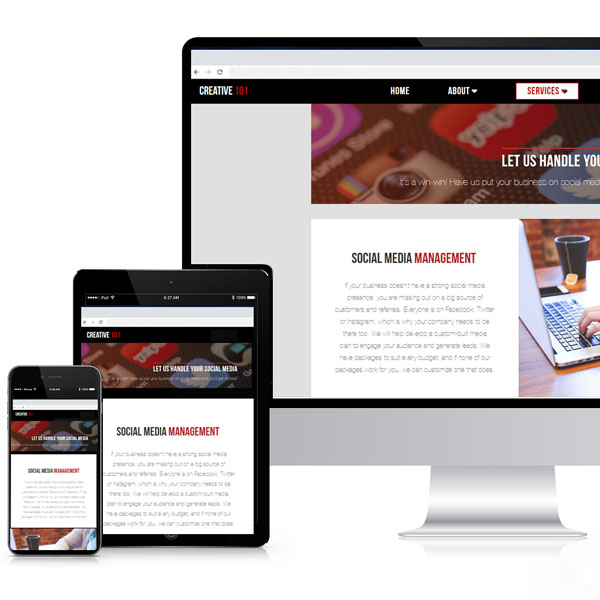
Template vs. Professional Website Design
Which is right for your business?
When it comes to Website Design and Search Optimization, you get what you pay for.
It's a cliche because it's true.
As more and more businesses realize their need for some kind of online presence, the number of options is also increasing exponentially. Smart business owners do their homework and consider the pros and cons of professional web design versus template or DIY options and even social media pages.
Weigh all your options
Do-it-yourself or template web sites are a much cheaper option than professionally designed web sites. Do-it-yourself means finding an online service that walks you through the process of creating your own website.
The problem is, you should probably have at least a passing knowledge of computer language, html and other computer code or you could be in for a frustrating time of it.
A template website service gives you a pre-designed site where you just plug in your info, maybe choose your colours and upload a few images.
The downside is the very definition of a template website means your options are limited and your website may end up looking almost identical to someone else's. In fact, if you choose a popular template design, you could find there are a lot of websites out there that look almost exactly like yours.
But if being unique isn't something you care about, then a template website could be a good option for you.
What will all those savings really cost your business?
So you manage to get your brand new DIY or template website up and running, but then what?
How will people find your website?
How do you know if your home page is compelling enough to make visitors want to contact you or buy your product?
Do you know how to track website visitors?
What if something goes wrong?
When considering a template or DIY website, you need to think carefully about who will be hosting your site and what kind of support services they offer, especially if your computer skills are limited. Is your host available by phone or online chat any time of the day or night to help you figure out why your site won't load? If not, can you afford to be without a website for hours, days or even weeks if they don't respond to your request for help right away?
Another thought on this topic ... How much is it worth to you to deal with real people you can talk to one on one, rather than some faceless Internet entity?
Where do you rank?
If you're looking at getting your own website, you've probably heard the term SEO, but do you know what it means? SEO - Search Engine Optimization - is all about making your website attractive to the search engines, like Google, Bing and Yahoo. Those search engines scan web pages using algorithms that determine how those pages will rank when someone types certain key words into the search bar. Professional web designers and SEO copywriters take the time to research key words and phrases particular to your products and services and then use those words when they develop the content for your website. While no one can guarantee you a #1 search page ranking, proper use of SEO can make the difference between having your site show up on page one or page three or page 10 of a search result.
And SEO is only one component of your overall Internet Marketing plan, which could include social media, online ads, blogs and link building.
Location, location, location
When you set up your new website, it will have an address or domain name. You may also hear it called a 'url'. Your domain name should be fairly short, easy to remember and use words naturally associated with your business, products and services. When you hire a professional web design company, their experts will work with you to get the best possible domain name for your website. If you use a template or DIY website, your options will be limited and you may even have to include the host's url as part of your website address. For example, www.johnsautoservice.randomwebhosts.com. Not only do you end up with a weak domain name that will potentially direct visitors to your host instead of you, it's a painfully long web address for people to type in.
It's all in the numbers
Analytics is another one of those mysterious Internet terms that people throw around, but not everyone really understands. The good news is, professional web design companies have people who DO understand analytics and can make sense of all that data and statistical information. What analytics comes down to is tracking the number of people who visit your website and how long they spend on your site or looking at any particular page. Analytics can also tell you how well your site is ranking on the search engines and identify problem areas for you to address. For example, maybe you aren't ranking well for one particular key word but a different phrase is doing better than expected. With this information, you can adjust the content, improve your search engine ranking and draw more visitors to your website.
A word about social media pages
What do Facebook, LinkedIn, Twitter, Google and the others have in common? They are all great ways to advertise your business and draw visitors to your website at virtually no cost to you! But they are no substitute for an actual website, dedicated solely to your business.
Another benefit of choosing a professional web designer is that they can help you create great-looking social media profile pages and even design a variety of apps to complement them.
Other website extras you can talk to a professional web designer about include e-commerce solutions, members-only pages, photo galleries, lead captures, blogs and links.
Being a business owner is all about balancing costs and benefits; weighing money saved against time spent and potential profits lost or gained. A template or DIY website might appear to be cheaper but you will probably have to settle for a lower quality product and could end up paying a lot more in the long run when you factor in the time and stress of building and maintaining your own website.
